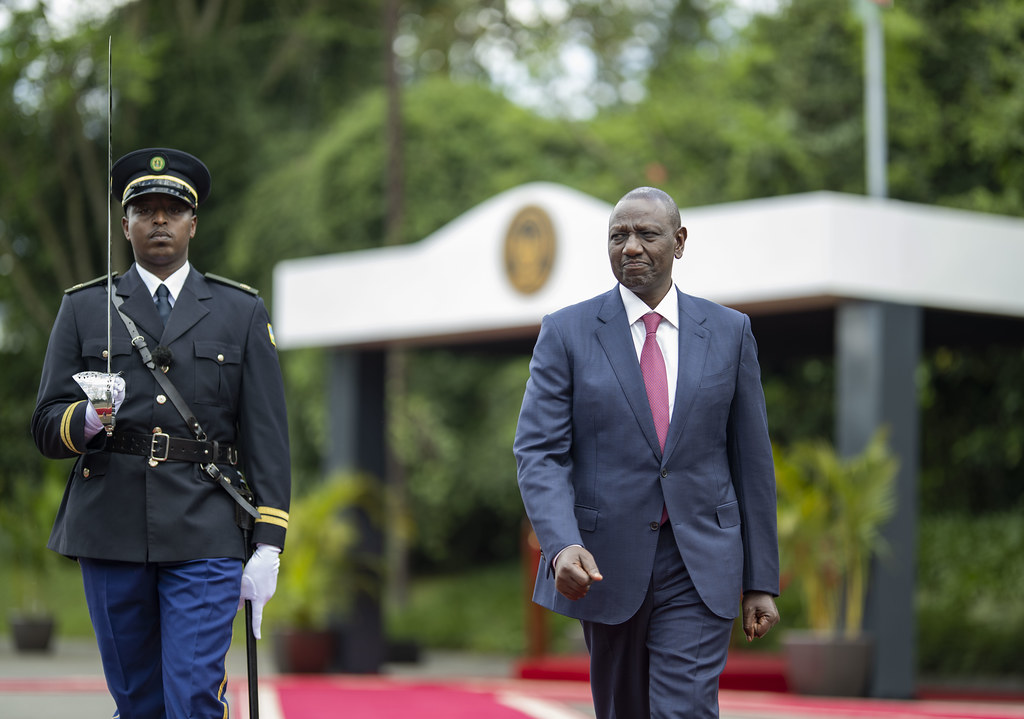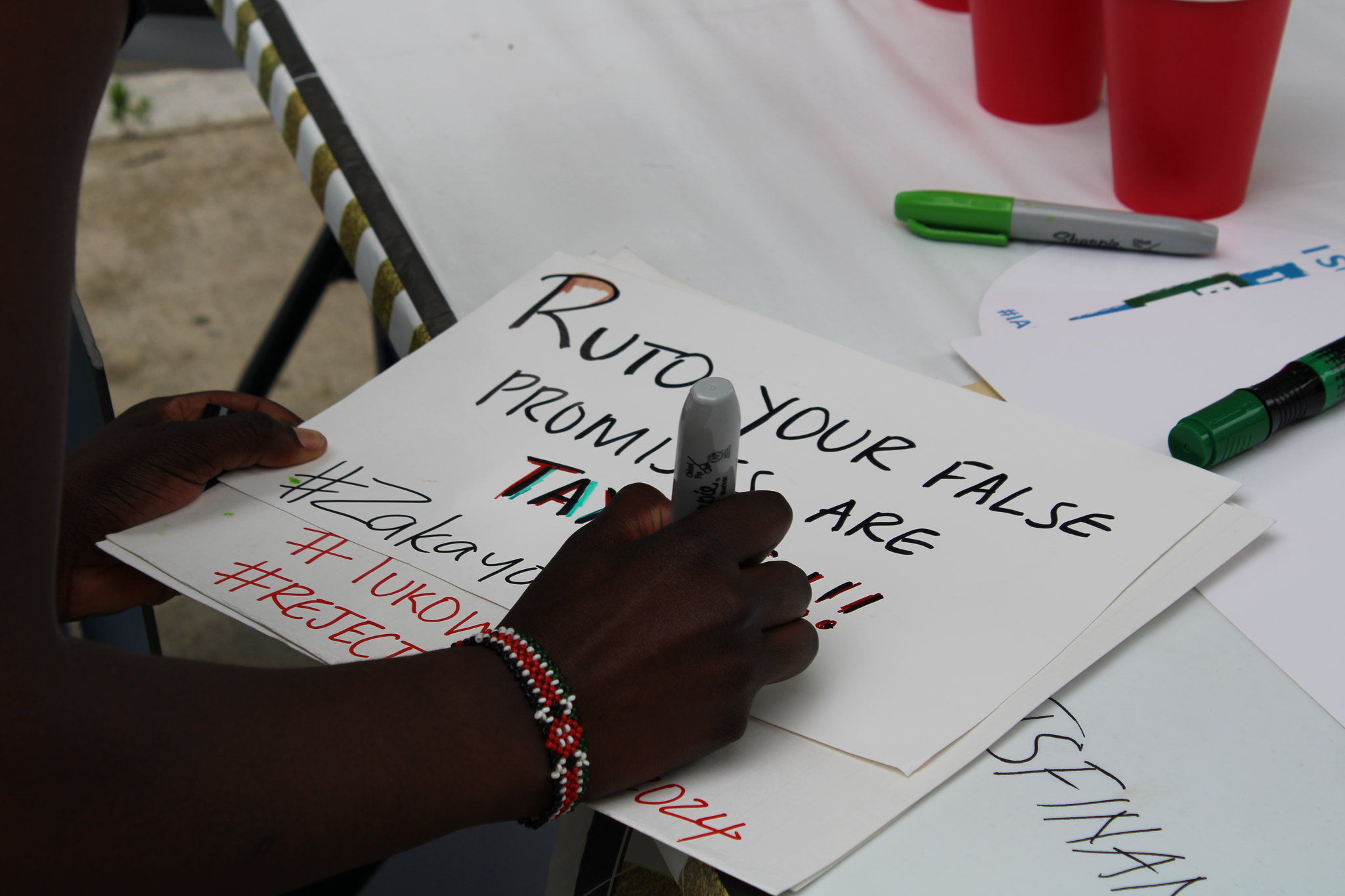Kenya's Finance Bill Protests
A Lesson in Debt, Democracy and Dependency
By Naila Aroni
Despite decades adhering to International Monetary Fund (IMF) policies, Kenya is currently facing a deepening debt crisis, with its debt-to-GDP ratio surpassing 70%. The IMF's relentless push for austerity has led to the Kenyan government’s controversial 2024 Finance Bill, which sought to raise $2.7 billion to partially meet IMF targets, through punitive tax hikes on everyday goods. This bill, heavily burdening the poorest Kenyans, ignited the largest social movement in modern Kenyan history.
The Kenyan government attempted to diminish the significance of the protests, as solely about tax hikes, hence why the President assumed he could appease the public by merely withdrawing the bill. Yet, protesters powerfully highlighted that the broader context behind the protesters is the legacy of colonialism, with signs like “colonialism never ended”. This is the second time Kenyans have protested against the IMF involvement in Kenya. In 2021, over 200,000 Kenyans, using the hashtag #StopGivingKenyaLoans, signed a petition to block a $2.3 billion loan intended to support the government's COVID-19 response.
While withdrawing the bill, President Ruto defended his motivations suggesting the withdrawal of the bill would set-back economic growth by “almost two years.” Instead, the government announced ambiguous plans to borrow more loans to recoup the deficit and meet debt obligations. This urgent dilemma epitomizes the broader crisis of colonialism by Western institutions which is threatening Kenya’s sovereignty.

President of Kenya, William Ruto (Source: Flickr)
THE IMF'S HISTORICAL ROLE IN STIFLING AFRICA'S DEVELOPMENT
President Ruto’s belief that IMF policies are key to economic transformation is easily refuted by examining the history of Structural Adjustment Programs (SAPs). The period of SAPs between the 1980s and 90s is often referred to as “a lost development decade” that stunted growth in developing countries. Pan-Africanists have long criticized International Financial Institutions (IFIs) as neo-colonial entities that undermine self-determination and development. For instance, Former Burkina Faso Head of State, Thomas Sankara famously said “Debt is a cleverly managed reconquest of Africa aimed at subjugating its growth and development through foreign rules.”
IFIs used debt to impose neoliberal policies, including devaluing currencies, privatizing state-owned enterprises and cutting social spending on health and education. These measures had detrimental effects such as doubling the number of Africans living in poverty. Decades later, Sankara’s warning remains relevant where policies like the Finance Bill, reliant on external directives, are threatening Kenya’s political economy and exacerbating widespread poverty.
Secondly, both the Kenyan government and the IMF have inadvertently exposed their failure to address the systemic causes of the deepening debt crisis. The IMF's 2023 paper, “How to Avoid a Debt Crisis in Sub-Saharan Africa,” notes that “Sub-Saharan African countries tend to rely excessively on expenditure cuts to reduce fiscal deficits,” while avoiding accountability for its role in enforcing such cuts. It acknowledges the high cost of reducing expenditures amid Africa’s substantial development needs but paradoxically continues to recommend fiscal adjustments. Adding to the irony, the President’s Economic Advisor, who co-drafted the Finance Bill, previously criticized IMF loans, claiming they signal that a country is “under receivership.” This contradiction underscores that neither the Kenyan government nor the IMF offers a credible solution to the crisis.
CORRUPTION AND MISMANAGEMENT FUEL KENYA'S DEBT CRISIS
The debt accrued from foreign loans is exacerbated by government mismanagement and deep-rooted corruption. During the previous administration, where Ruto served as Deputy President, former President Uhuru Kenyatta admitted that Ksh2 billion ($18.5 million) was lost to corruption each day. Additionally, IMF programmes can inadvertently increase corruption, as the privatization of state-owned entities in a context of weak anti-corruption institutions, promotes public officials enriching themselves through “tenderpreneurship,” a term describing the manipulation of public tenders for personal gain. For instance, KSh7.8 billion ($60 million) was spent on PPE gear during the COVID-19 pandemic, funds that remain unaccounted for.
Public expenditure is further misused on extortionate salaries and allowances for state officials. Kenyan MPs are the second highest-paid legislators in the world per capita. Extravagant budgets are allocated to the redundant offices of the first lady, deputy first lady, and the spouse of the prime minister, each over Kshs 500 million ($3.8 million). To add insult to injury, corrupt legislators routinely parade this wealth on national and social media and public rallies such as flaunting $128,000 designer watches. It’s no wonder that critics and protesters deemed the Finance Bill as a “cash grab from the poor to sustain the lifestyles of the rich,” as the IMF is essentially rewarding corrupt governments.
 Kenyan Protesters (Source: Flickr)
Kenyan Protesters (Source: Flickr)
KENYA'S RISING GEOPOLITICAL IMPORTANCE
The USA also plays a role in Kenya’s diminishing sovereignty and political independence. The clearest indication of Kenya’s status as a US darling is Ruto’s visit to the White House in May, just days before the Finance Bill was tabled, where President Joe Biden declared Kenya a major non-NATO ally. At first, the US endorsement of Ruto appears contradictory, given America’s self-proclaimed role as a global advocate for human rights and democracy. The USA is aware of President Ruto’s controversial reputation, including his indictment for crimes against humanity at the International Criminal Court.
Yet, foreign policy experts explain that Kenya is a geopolitical asset to the West due to Kenya’s strategic role in East Africa. Kenya has been a key player in the "war on terror," with Kenyan soldiers stationed in Somalia. Moreover, Kenyan soldiers were recently deployed to Haiti to support the US mission, prompting outcry from Kenyans who held signs at the protests reading “Kenya and Haiti are not for sale.” Therefore, the US will continue to sanitize him, promoting the image of a stable and peaceful Kenya. This is why the US Secretary of State commended Ruto’s efforts to “reduce tensions” and “engage in dialogue with the protestors” despite overwhelming evidence that over sixty protesters were killed by police and many illegally abducted.
REIMAGINING KENYA'S FUTURE: A PAN-AFRICAN APPROACH
If the IMF’s regressive tax advice and austerity measures are not the solution, it begs the question: how can African governments uphold economic sovereignty while meeting existing debt obligations? One approach is to expand revenue collection by broadening the tax base and targeting the wealthiest individuals and companies, rather than overburdening already taxed citizens. According to the Tax Justice Network, Kenya is highly complicit in multinational tax avoidance, losing $190 million annually due to global tax abuse. This is largely attributed to multinational corporations, which have a tax compliance rate of only 70%, according to the Kenya Revenue Authority. This alarming figure equates to 9.5% of Kenya’s healthcare budget and 4% of its education budget. Redirecting these lost revenues could significantly increase social expenditure where it is most needed.
Secondly, Pan-African industrialization policies can decolonize the Kenyan economy and transcend the colonial model of resource extraction. Kenya, like much of the global south, remains at the bottom of the global value chain by exporting low-value goods such as tea and flowers while importing high-value manufactured products. This dynamic has hindered Kenya’s position in global trade, with Africa now accounting for less than 3% of global trade, a decline from 5% during independence.
The African Continental Free Trade Area (AfCFTA) presents a major opportunity for intra-African trade and growth. AfCFTA aims to reduce tariffs among member countries and covers policy areas such as trade facilitation and services. Preliminary World Bank estimates suggest that AfCFTA could increase intra-African exports by 109%, primarily driven by manufactured goods, and boost exports to the world by 32% by 2035. As the largest free trade area in the world, AfCFTA also has the potential to enhance Africa’s bargaining power in global trade negotiations. However, despite previously praising AfCFTA, President Ruto undermined its ethos by signing the Economic Partnership Agreement in 2023, contradicting the goals of a united African front.
African leaders must unite and collectively demand debt cancellation. The significance of debt cancellation is exemplified by the IMF’s Highly Indebted Poor Countries Initiative (HIPC) in the 2000s, which aimed to provide debt relief to poor nations struggling to service foreign debt burdens. This initiative was a positive step toward poverty reduction, as it reduced debt burdens and gave African countries breathing room to develop. However, framing cancellation campaigns as humanitarian assistance lacks accountability for the IMF's role in providing unsustainable loans. Furthermore, the risk of default is inherent when creditors lend money, which is why high-interest rates are charged. After all, The UN Conference on Trade and Development (UNCTAD) recently found that African countries pay IMF interest rates that are four times higher than those in the USA and eight times higher than in Germany. Therefore, African leaders must demand debt cancellation not as relief, but as economic justice for extortionist lending practices.
President Ruto must resign to protect Kenya’s sovereignty and prosperity. His failure to deliver a valid Finance Bill since taking office is a clear sign of incompetence and grounds for resignation. The Court of Appeal recently declared the Finance Bill unconstitutional and void, citing a lack of required public participation. Additionally, the 2023 Finance Act, which included a mandatory housing levy, was repealed by the High Court for being unconstitutional and discriminatory.
Furthermore, Ruto has consistently threatened Kenya’s democracy and security. He has defied the constitution and threatened the independence of the judiciary, openly stating his intentions to defy rulings that overrule government projects such as the Affordable Housing Programme. Ruto has also endorsed police brutality by deploying the military against protesters and is facing allegations of brutality and abductions. To restore the government's credibility Ruto must step down, demonstrating that public servants are accountable to the people of Kenya, not rulers above them.
The Kenyan government's decision to push forward with the Finance Bill under IMF supervision, despite knowing it would provoke mass unrest, was a grave mistake. To address this crisis, the Kenyan government must explore progressive solutions to revenue generation, while the IMF must accept responsibility in enabling corrupt and poorly governed regimes, which is long overdue. Kenya's experience also serves as a cautionary tale for other African nations grappling with debt traps and rising tax burdens, such as Uganda and Nigeria, where citizens are also protesting poor governance. By heeding Kenya’s lessons, African leaders can better navigate debt management and economic reform, paving the way for more inclusive and equitable development.
Naila Aroni is an artist, writer and cultural analyst from Nairobi, Kenya. Her background in policy further informs her work, advocating for inclusivity and the sustainable development of Africa's creative economy. Aroni's policy experience includes providing programme delivery and communications support to development consultancies and international non-governmental organisations. She holds a Master of Science in Development Studies from SOAS University of London and a Bachelor of Laws from the University of Warwick.
Editor: Temi Ibirogba
This article is part of The Africa Center’s Policy Positions series, the recurring publications will offer thoughtful engagement with contemporary policy and governance issues related to the African continent. Policy Positions are submitted by members of The Africa Center’s community of thought leaders from across Africa and the African Diaspora. Follow @theafricacenter on Twitter, Instagram and LinkedIn to stay informed of new posts, and reach out to the editor to submit an idea for consideration.
